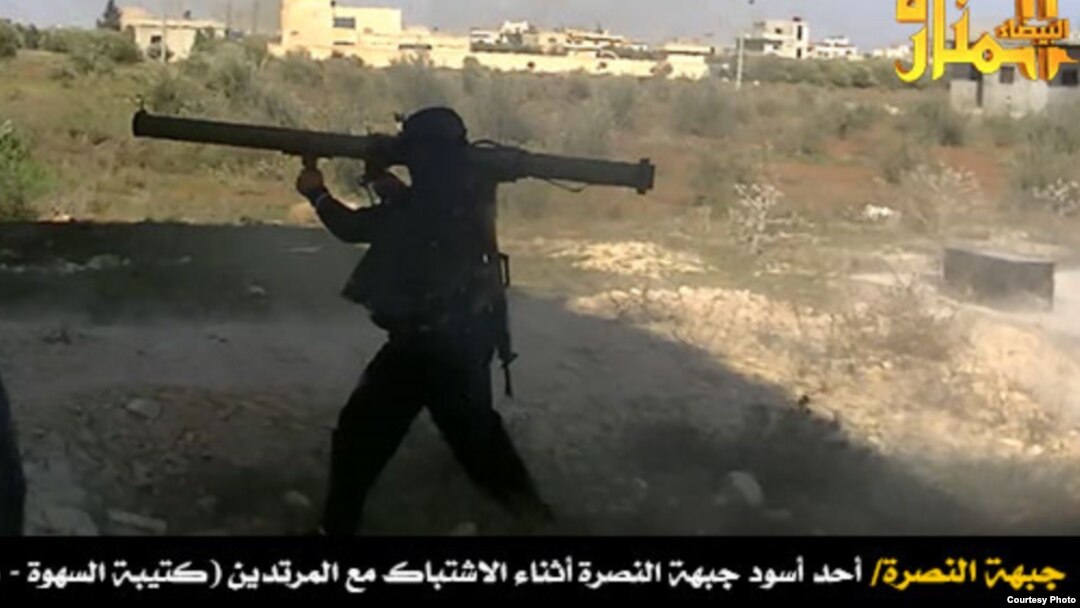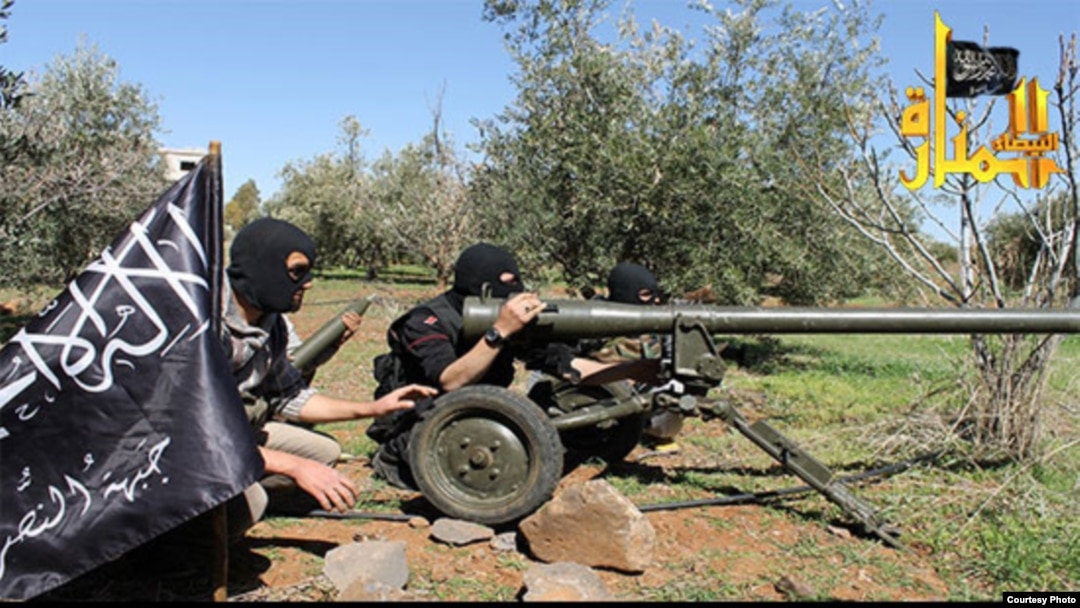A Syrian rebel group the Obama administration considers a terrorist organization is managing to obtain modern anti-tank weapons meant for other groups fighting to oust President Bashar al-Assad, according to regional experts.
The Jihadist Jabhat al-Nusra militia is managing to secure weapons being supplied by Saudi Arabia and Qatar to rebel brigades affiliated to the Free Syrian Army, the experts say. The Obama administration considers al-Nusra a terrorist organization because of suspected links with al-Qaida.
The weapons include the Croatian-made M79 portable 90 mm anti-tank gun and M60 recoilless anti-tank weapons. Regional experts say Saudi Arabia and Qatar had been supplying such weapons to rebel units more acceptable to the West, mainly secular or nationalist-focused groups such as the Free Syrian Army (FSA) brigades fighting to oust the Assad government.
Croatian-made weapons
According to the experts, the weapons are now appearing in the hands of al-Nusra fighters in videos posted by group on Jihadist websites.
In February, the New York Times first reported that the Saudis were supplying Syrian rebels with arms bought from Croatia. The supply operation was prompted by the fear in the West, and among Gulf allies, that Jihadist groups were better equipped than other rebel units and were increasingly able to dominate the anti-Assad movement.
The newspaper reported Monday that U.S. Central Intelligence Agency consultants were helping Arab nations and Turkey in getting heavy weapons to the Syrian rebels despite Washington’s public stance against supplying such weapons itself.
Citing air traffic data and interviews with unnamed officials and rebel commanders, the Times said the weapons airlift to the rebels had grown to include more than 160 military flights by Jordanian, Saudi and Qatari cargo planes landing at Esenboga Airport near Ankara, and at other Turkish and Jordanian airports.
Reports of CIA assistance
Croatian weaponry believed to be part of those airlifts had been seen being used earlier this year by other Jihadist groups fighting in Syria, but al-Nusra videos posted on the internet this weekend showed for the first time their fighters using the M79 and M60 antitank weapons.

Since announcing its formation in Syria in early 2012, Jabhat al-Nusra has grown rapidly and is considered one of the most effective forces opposing the Assad government.
The rise of al-Nusra, which has homegrown fighters in its ranks as well foreign jihadists drawn from elsewhere in the Middle East, North Africa, and Central Asia, has complicated Western considerations about whether and how to supply arms to the Syrian rebels.
British and French want stepped-up shipments
The British and French governments have been pushing to increase the flow of weapons to the Syrian rebels, but other European nations have resisted, arguing that the equipment could fall into the hands of jihadist groups such as al-Nusra. Critics of the Anglo-French position said the intended recipients of the weapons, the FSA rebel units, worked too closely with al-Nusra to keep the weapons to themselves.
“We were concerned that the FSA is not really a cohesive force with a single command-and-control structure, but is far more a loose alliance of rebel brigades,” says a German diplomat based in Brussels. “We didn’t believe the FSA could or would even bother to police who received any European-supplied weaponry. FSA units fight alongside al-Nusra and other Jihadists.”
Al-Nusra, like other rebel units, also uses weapons it seizes from captured Syrian army facilities.
This past Saturday, al-Nusra fighters joined other rebel units in overrunning an air defense base in southern Syria’s Daraa Province near the border with Jordan. Videos posted by al-Nusra appeared to show rebel fighters carting off portable surface-to-air missiles, often called SAMS or MANPADS, for “Man-Portable-Air-Defense-System.”
Syrian rebels have been urging the West and Gulf countries for months to supply the rebellion with such anti-aircraft missiles, but the Obama administration has said “no.” It also has urged allied not to supply such missiles, fearing they would fall into the wrong hands.
But with each capture of Syrian army bases, though, there are opportunities for rebels, Jihadists included, to seize anti-aircraft missiles, Western security officials say.
The Jihadist Jabhat al-Nusra militia is managing to secure weapons being supplied by Saudi Arabia and Qatar to rebel brigades affiliated to the Free Syrian Army, the experts say. The Obama administration considers al-Nusra a terrorist organization because of suspected links with al-Qaida.
The weapons include the Croatian-made M79 portable 90 mm anti-tank gun and M60 recoilless anti-tank weapons. Regional experts say Saudi Arabia and Qatar had been supplying such weapons to rebel units more acceptable to the West, mainly secular or nationalist-focused groups such as the Free Syrian Army (FSA) brigades fighting to oust the Assad government.
Croatian-made weapons
According to the experts, the weapons are now appearing in the hands of al-Nusra fighters in videos posted by group on Jihadist websites.
In February, the New York Times first reported that the Saudis were supplying Syrian rebels with arms bought from Croatia. The supply operation was prompted by the fear in the West, and among Gulf allies, that Jihadist groups were better equipped than other rebel units and were increasingly able to dominate the anti-Assad movement.
The newspaper reported Monday that U.S. Central Intelligence Agency consultants were helping Arab nations and Turkey in getting heavy weapons to the Syrian rebels despite Washington’s public stance against supplying such weapons itself.
Citing air traffic data and interviews with unnamed officials and rebel commanders, the Times said the weapons airlift to the rebels had grown to include more than 160 military flights by Jordanian, Saudi and Qatari cargo planes landing at Esenboga Airport near Ankara, and at other Turkish and Jordanian airports.
Reports of CIA assistance
Croatian weaponry believed to be part of those airlifts had been seen being used earlier this year by other Jihadist groups fighting in Syria, but al-Nusra videos posted on the internet this weekend showed for the first time their fighters using the M79 and M60 antitank weapons.

Syria's al-Nusra rebels post a photo of its fighters using an M-79 anti-tank weapon.
“Neither of these weapons are locally available, either from the black market or looted from the Syrian army because they don't have them,” said British-based weapons researcher, Eliot Higgins, who first spotted the videos. “That's what made them so easy to track; they stand out like sore thumbs in Syria.”Since announcing its formation in Syria in early 2012, Jabhat al-Nusra has grown rapidly and is considered one of the most effective forces opposing the Assad government.
The rise of al-Nusra, which has homegrown fighters in its ranks as well foreign jihadists drawn from elsewhere in the Middle East, North Africa, and Central Asia, has complicated Western considerations about whether and how to supply arms to the Syrian rebels.
British and French want stepped-up shipments
The British and French governments have been pushing to increase the flow of weapons to the Syrian rebels, but other European nations have resisted, arguing that the equipment could fall into the hands of jihadist groups such as al-Nusra. Critics of the Anglo-French position said the intended recipients of the weapons, the FSA rebel units, worked too closely with al-Nusra to keep the weapons to themselves.
“We were concerned that the FSA is not really a cohesive force with a single command-and-control structure, but is far more a loose alliance of rebel brigades,” says a German diplomat based in Brussels. “We didn’t believe the FSA could or would even bother to police who received any European-supplied weaponry. FSA units fight alongside al-Nusra and other Jihadists.”
Al-Nusra, like other rebel units, also uses weapons it seizes from captured Syrian army facilities.
This past Saturday, al-Nusra fighters joined other rebel units in overrunning an air defense base in southern Syria’s Daraa Province near the border with Jordan. Videos posted by al-Nusra appeared to show rebel fighters carting off portable surface-to-air missiles, often called SAMS or MANPADS, for “Man-Portable-Air-Defense-System.”
Syrian rebels have been urging the West and Gulf countries for months to supply the rebellion with such anti-aircraft missiles, but the Obama administration has said “no.” It also has urged allied not to supply such missiles, fearing they would fall into the wrong hands.
But with each capture of Syrian army bases, though, there are opportunities for rebels, Jihadists included, to seize anti-aircraft missiles, Western security officials say.


